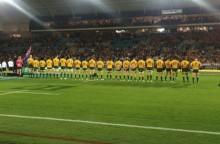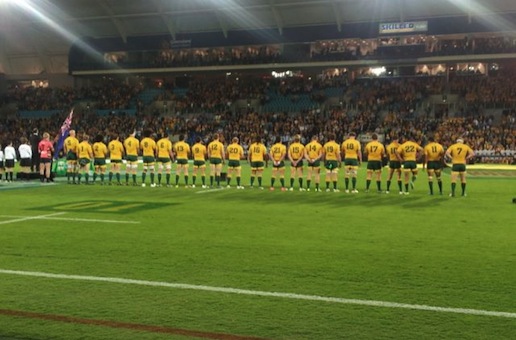The current Wallabies tour of Europe presents massive challenges on and off the field and has enormous significance for this team and the code in Australia. We may never pass this way again, to quote Seals and Crofts.
 Along with their own Samsonites, the Wallabies loaded the following baggage on QF1:
Along with their own Samsonites, the Wallabies loaded the following baggage on QF1:
- Australian Rugby is in a crisis;
- the team’s benchmark opponent, the NZ All Blacks, is at its zenith;
- the Wallabies have extensive injuries to key players and leaders; and
- the entertainment factor that is a core value of the Wallabies brand is missing.
Further, they head into Europe facing Les Bleus in the first game followed by England a week later.
The French have scores to settle. The French invariably have scores to settle. They are as reliable and predictable as a two year old Peugeot. Those who have been at the bottom of a pre-1990s rugby ruck anywhere in France know that revenge is their middle name.
The motivation for the revenge includes:
- the last start 59-16 loss to the Wallabies in 2010;
- finishing second in the World Cup, but being ranked only 5th by the IRB;
- possession of the Top 14, the best funded domestic league in the world;
- a poor performance in the 2012 Six Nations;
- some very good, hungry, young players and a new captain; and finally
- a very aspirational and well credentialled national coach in Philippe St Andre — have a look at his 1991 try against an unsuspecting, dozy England team.
[youtube id=”h3PHyrbUNM4″ width=”600″ height=”350″]
The other danger game for the Wallabies is England. Twickenham is a daunting stadium and England are the best resourced rugby team in the world in terms of player depth, supporters and finances. They play a deeply ingrained, forward dominated, breakdown focussed game that traditionally does not suit the Wallabies. The English are coming off a disastrous RWC 2011, with a new inexperienced coach and hounded by a famously rabid press corp.
The strategic brief for the Wallabies must be, in this order:
- in every match, play 80 minutes of passionate committed rugby that the country can be proud of;
- win every game, no matter the margin — this will ensure that the RWC 2015 seedings will separate Australia from New Zealand until the final;
- play expansive, skilful rugby — this will start to rebuild the Wallabies brand in the minds of the swinging (some might say shallow or fair-weather) supporter who is seeking entertainment; and
- ensure that all of the above results in dominant wins, as shown on the scoreboard.
Point 4 will concurrently chip away at the currently massive self belief of the All Blacks and build the Wallabies’ fragile (or even naïve) self-belief.
The current gap between the teams’ respective self-beliefs is enormous. But it can narrow quickly as one shrinks and the other grows. It is a zero sum game. A 10% point change to 50:50 results in a 20% point difference (60:40).
The only way to overcome the All Blacks is by slowly chipping away at their self-belief. The 1991, 1999 and 2003 Wallabies teams did this. Sydney and Auckland Bledisloe matches entrenched this self-belief.
In Brisbane this year, the Wallabies stopped the All Blacks from achieving a world record number of wins. This defiance needs to continue.
The All Blacks are smart. They know what a good rugby team and good rugby looks like. They also know that the Wallabies are their true rivals for any rugby success. The All Blacks watch the Wallabies closely. There is nothing better for the Wallabies than for the All Blacks to look over their shoulder more and more frequently.
Just as the upside is enormous, so is the downside. If this young Wallabies don’t achieve any of the four objectives, there is a strong chance that another generation of Wallabies has been emasculated, and the game of rugby in Australia, at all levels, will continue to decline towards a tipping point from which there is no return.
International rugby is supposed to be country against country. Players play for the pride of their country — they represent their country and their countrymen.
But money has changed this. More games meant more television revenues, more gate receipts, more merchandise, more sponsor revenues, more exposure and more column inches. There was always a risk was that more matches would devalue each game. Supporters have a finite amount of money, time and emotion to commit to a sport.
Never has there been a more important Wallabies tour!


